Northern development: Alice off to hesitant start
31 August 2014
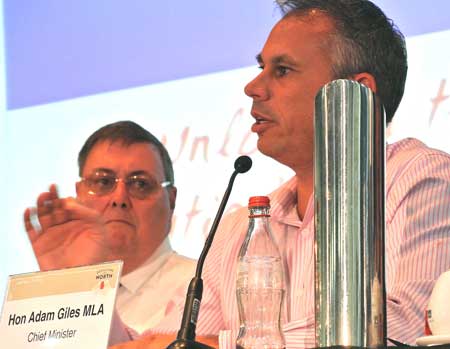 By ERWIN CHLANDA
By ERWIN CHLANDA
“Don’t mention the war.”
These timeless words from the comedy hit Fawlty Towers could have been the motto for Friday night’s meeting called to acquaint Alice Springs with Northern Australia Development (NAD).
In the middle at the panel table, facing the crowd of about 100, sat Chief Minister Adam Giles (at right, with Mayor Damien Ryan).
His political life was hanging by a thread. His former deputy, Dave Tollner, who recently resigned by his own choice, or so Mr Giles had told the public, had just dropped the bombshell that he wouldn’t be able to work with a number of his Parliamentary colleagues if they didn’t show him a bit of support.
Mr Tollner’s departure from the government benches could tip out the Giles government.
But when finally people in the audience got the chance to ask questions, not a single one was put to Mr Giles about what he was going to do about the mess his government had gotten into, half-way thorough its first term.
There was no challenge to Mr Giles’ vision of himself presiding over a Golden Age as NAD unfolds. And rather than being the occasion for formulating forward-looking policies and projects, the evening became largely an opportunity for Mr Giles to defend his record: Kilgariff, the success of the cops at bottle shops in reducing crime.
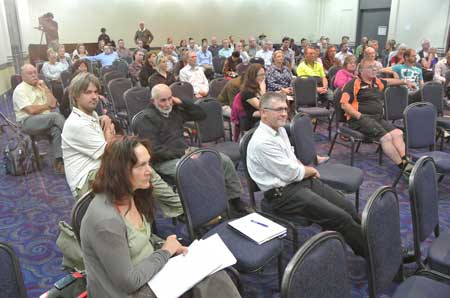 Whilst mostly avoiding being specific, he dropped hints that Alice would again have a second airline soon, and that an announcement about the Melanka site was imminent.
Whilst mostly avoiding being specific, he dropped hints that Alice would again have a second airline soon, and that an announcement about the Melanka site was imminent.
[Yesterday his office, responding to an enquiry from the Alice Springs News Online, had this to say: “The NT Government is currently assisting potential developers in considering design options for the site. The Government will not be contributing financially to the development. The Chief Minister, the Minister for Lands and Planning and the Minister for Central Australia are working together to develop the site and are actively supporting the concept of a building of significance that towers impressively within the CBD.” The word “towering” tallies with a rumour that the complex could be eight stories high. We did not get a specific response on that point.]
Venturing onto the stage of global diplomacy Mr Giles revealed that “China has just signed up to partnerships in the Top End with Australia and the US” for military exercises.
On that topic panel member Mayor Damien Ryan said “Joint Defence” – Pine Gap – are “a wonderful corporate citizen … contributing widely to the economy”.
He referred to the military build-up in Darwin and wondered how Alice could benefit: “A lot of events around the world are happening in climates we have here in Central Australia” and this would make it an ideal place for military training.
The meeting was further remarkable for the absence of propositions from the floor: the thrust was, what can the government do for us? There was very little of: this is what we demand the government must do.
The lobby for the town’s major private industry was absent: not a peep from Tourism Central Australia (which was also the only one of the town’s five major pressure groups not to participate in the recent Two Years of CLP Government series in the Alice Springs News Online).
The questions, in roughly equal numbers, came – firstly – from online posting plus some presented to the show stall, and – secondly – from the floor.
The authors of the questions not presented at the meeting were not named. Some of them were far from dealing with the broad view of northern development: remove scale from household water – it clogs up pipes and may cause kidney problems, one contributor suggested.
Panel member Robyn Lambley, the Health Minister, said the town water presents no health risk, does not cause renal disease, and meets guidelines. It’s not worth spending money on this, she said.
Notably missing also was an Aboriginal presence and questions of economic development capturing the potential of their labour, talents, enterprise and assets – amazingly so, as they surely have a key role in any northern development story and represent already, including through their art industry, a significant reason for visitors to come to the Territory.
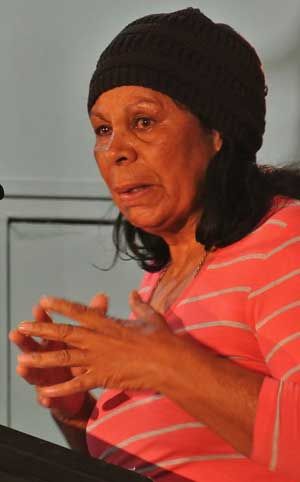
The exceptions were quirky Uncle Peter, without whose presence no public meeting in Alice Springs seems to be complete. Displaying an assertiveness no-one else in the room mustered, he addressed part of the panel: “It’s good to see my employees, Adam, Damien, Robyn. You are politicians. We employ you.”
On a more poignant note, and coming as a surprise because her role was to deliver the Welcome to Country, usually ceremonial, were the comments from prominent native title holder Rosalie Riley (at right).
Delivering her brief speech in Arrernte and English, she called for harmony: Arrernte business is also business, she said, and sacred sites are very important.
“Development is taking over our country as well. These are crucial times. We need harmony. Through it we will acknowledge each-other’s potential.
“This wonderful country of ours, let’s embrace it together. No one tribe owns one land. That means the white community as well.”
Not surprisingly, the economic slump was raised by several speakers, including Councillor Kylie Bonanni (below left), who said she was “elected [to the town council] mainly through the people in the building industry.”
What’s happening now, she asked Mr Giles. The town needs more work so money can trickle down through the local economy.
“In the next six months, no-one knows what’s happening,” she said. Businesses are on the verge of closing.
Countered Mr Giles: “I could throw it back at you and ask, what are you doing about it?” He said he had just received a text message from a Vietnamese investor who will be investing $300m in Darwin.
Ms Bonanni interrupts: “Let me just …”
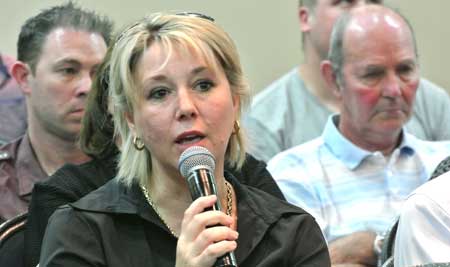 GILES: No, no, hang on …
GILES: No, no, hang on …
BONANNI: No. You have asked me the question what I would do. We have, as a business, and as a family contributed strongly to Alice Springs. We are builders. We have built when there is confidence in the town. There is not that confidence right now, Mr Giles. We were asked to commit to another building project, which we have in the pipeline now. We do this when times are slow. We are contributing to the Territory. We are not people who sit and wait. Fantastic that we’ve got this oil and gas coming but a lot of that, really, won’t build much on the economy of Alice Springs and its population.
GILES: I think it’s a fair question to put back. You are on the town council, you are sitting next to the CEO of the council [at the meeting], we’ve got the Mayor here, and there are other people around. I don’t think we can just say government … what are you doing to spend the money. We need people on council to say things are bright. We don’t need to say, oh, half the shops in town are empty. We need people to say, how can we get these shops open. How do we get the landlords to drop their rents? It’s very easy for everyone to say, Adam, spend more money. I’m only going to borrow it from overseas.
Mr Giles said, repeatedly, that NAD will ensure there is a plan, that it will provide more need for labour, jobs for kids.
He also said the Indigenous welfare “industry” needs to converted to “economic welfare”.
Bucks from Feds
Mayor Damien Ryan said Alice could be turned into a base for the Australian government’s remote development strategy.
The role of the town’s training hospital could be boosted, in collaboration with Charles Darwin University. This would increase the population and “private investment will come with certainty”.
What the frack!
Speaking from the floor Jason Trevers (below) expressed concern over “67,000 fracking wells planned in the NT”.
Panel member Matthew Doman, Manager for Public Affairs, Eastern Australia, for the oil and gas company Santos Limited, claimed that figure being “bandied around” was “extremely unlikely”.
His comments were very similar to the ones Santos gave at a recent town council presentation.
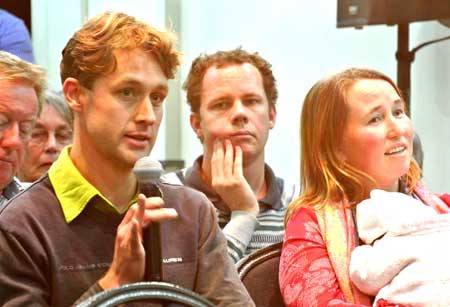 TREVERS: I have seen rivers bubbling up through cracks [as a result of fracking], livelihoods threatened, kids with blood noses five days on end, seizures, fits, can’t move their arms. [In Java] 50,000 people displaced, 12 villages covered.
TREVERS: I have seen rivers bubbling up through cracks [as a result of fracking], livelihoods threatened, kids with blood noses five days on end, seizures, fits, can’t move their arms. [In Java] 50,000 people displaced, 12 villages covered.
Mr Doman replied Santos does not claim to be perfect. Environmental incidents are listed on documents which are in the public sphere. These are “typically spills of liquids”. Both sides of the debate need to be “truthful”.
DOMAN: There are no children in Queensland who have blood noses from coal seam gas, no farms that have been made worthless. If you have the evidence of it I’d really like to see it. These things have been investigated by the Queensland Department of Health … and proven to be untrue.
Pastoralists, represented by Cattlemen’s Association CEO Tracey Hayes, made it clear that the relationship between station people and the oil and gas industry needs a lot of work if the endemic clashes over fracking in other states are to be avoided.
She said the first contact is sometimes blunt: “A pastoralist receives a registered letter in the mail advising them that a mining, oil or gas company is coming onto their property … the next course of action is the mining tribunal.”
She said the attitude of some companies is respectful, others not, and lack of respect at the outset will lead to problems.
The NT Government should be looking at the regulatory framework now, not down the track: “There is growing unrest in the community. The last thing we want to see is campaigns that have gone on in the east of Australia where you have people within the one industry battling against one another across the fence.” (Applause.)
Hello Dorothy
“What will Northern Development mean for Alice Springs,” was the question, sounding a bit like a Dorothy Dixer, from one unnamed questioner.
Alice will grow as a service centre, not rapidly but over time, providing also education and medical services, replied Mr Giles.
Ms Hayes said she is also the owner of a small business (the equipment hire firm in Ghan Road), a “thermometer” of the state of the town: “It’s pretty sad to see what’s happening now.”
She said Central Australia provides a respectable 20% of the gross state product. Rhetoric must be converted into real opportunities.
Growth stalled, going backwards
Ms Lambley said the town has not expanded in 20 years, and lately the population has regressed. It’s a battle “to sustain what we have”.
The town is struggling to sustain the shot in the arm from the Federal Intervention over the last seven or eight years and to maintain population. But it is doing better than other towns, like the ones “wrapped around a mining project”, she said.
Out bush
What is the vision for the bush and Aboriginal people? Mr Giles said we need to give people a job then train them up with a focus on semi-skilled, low-skilled and unskilled works which is commensurate with “the general [current] education base we’re trying to find jobs for”.
He said: “Yes, we have to tighten welfare to entice people into those jobs.”
Panel member Michael Ossipoff, from Telstra, philosophised about similarities between roads and telecommunications, and the aptitude of Aboriginal people in using IT gadgets, to “record their stories, in English and in language”. He said seeing kids with iPods and smart phones make him “very proud as a telco, it’s very good news for us”.
He had nothing to say about Telstra abandoning its universal service obligation to users of mobile phones – fast taking over as the preferred telephone in The Centre.
Why don’t we use satellites instead of cables dug into the ground, asked Judith Dona. It’s too slow, replied Mr Ossipoff.
Mr Giles said 34 bush communities are now connected to the world by fibre optic cables and a $5.9m partnership with Telstra to provide phone and broadband services is nearly complete.
The NT Government is also looking at the costs of providing WiFi all the way up and down the Stuart Highway.
The power game
Should there be a program to switch outback electricity generation from diesel to renewables in the next 10 years?
Mr Giles said a time frame would not be realistic but the government has embarked on a program to connect communities to the grid which gets its power mostly from natural gas. Hermannsburg (Ntaria) is already connected.
Mr Doman said South Australia gets 27% of its electricity from wind and 50% from gas, “the cleanest of fossil fuels”.
When the wind stops, gas generation can be turned in minutes. To fire up a coal power station takes days.
On the road again
Mr Giles says we are “150 years behind” in the development of roads. The NT has 17% of the nation’s landmass but only 1% of the Federal infrastructure budget.
 He says the Feds now mandate that roads must be “economical” to get support: the only road meeting that requirement, out of all the 77,000 kilometres of Territory roads, is the five kilometer connection between Tiger Brennan Drive and Port Darwin.
He says the Feds now mandate that roads must be “economical” to get support: the only road meeting that requirement, out of all the 77,000 kilometres of Territory roads, is the five kilometer connection between Tiger Brennan Drive and Port Darwin.
Mayor Ryan said Deputy Prime Minister Warren Truss has announced his support for the “third crossing of Australia,” the Outback Way linking east with west, a potential boon for rail, the cattle industry and remote communities.
Ms Hayes (at right) said we need a masterplan for roads, not yet some more studies: “Shitty roads 10 years ago are still shitty roads today.”
Maybe $70b of superannuation money now invested offshore could be used for building roads, perhaps guaranteed by government bonds. (Applause.)



Reading Chief Minister’s comment, “It’s very easy for everyone to say, Adam, spend more money. I’m only going to borrow it from overseas”‘ brings home the trap we have fallen into, not just here but around the world.
Europe is confronted by stagnant economies and high unemployment after following a period of austerity in response to the GFC. Only Japan has taken a different tack after 20 odd years of economic stagnation.
Our current response is to tighten welfare and reduce taxes then hope. Not for 20 years surely.
I say borrow the money while interest rates are low and make some well targeted investments. Maintain the RET and put a price on carbon that will drive more investment in renewable energy. Encourage adoption of electric vehicles to soak up generation capacity and reduce the cost of transportation in central Australia.
Private investment will follow public investment. Get on with the job.
The stand out in this story is Mrs Bonanni. Sometime ago I urged her on this site to step up in her capacity as Deputy Mayor and show some leadership.
Clearly she has done that with our so called Chief. We’ll done. Continue to take him to task Mrs Bonanni, that is exactly what needs to happen.
You read here, in newspapers and listen to Giles responses everywhere – he never has substance or depth in his answers. He’s the NTs version of Kevin Rudd and will experience the same future at the polls.
If the CLP management is serious about the NT, they will ensure his wing replaces him with someone that actually knows what they’re doing!
Good to see Bonanni standing up for the town, the mayor can’t because he is effectively an employee of the government through his [board roles].
One wonders if the CLP leadership can be united enough to steer meaningful northern development or will they be preoccupied with the endless infighting and splits?
A pity that Elferink has tarnished his image by getting involved in the messy Peter Maley debacle He desperately needed to stand above the fray but has unnecessarily involved himself, trashing his own leadership prospects in the process.
While Minister Lambley did not indicate the source of the data to support her observation that the Alice Springs’ “population has regressed”, the Australian Bureau of Statistics Local Government Area estimated resident population statistics show that the population increased from 26,665 in 2003 to 28,720 in 2013.
The population went slightly backwards in 2004-5 by a few hundred persons. The Northern Territory Treasury and Charles Darwin University work together to produce population projections and these can be found at http://www.treasury.nt.gov.au/Economy/populationprojections/Pages/default.aspx.
The projection for the Alice Springs region indicates a substantial increase in population over the next 15 years partially based upon fewer older people leaving the region to retire elsewhere.
@ Don: I project in one year I will win lotto. And be free of finical debt.
Why do you think people are going to stay here when their children have left and grandchildren are growing up without them?
Until Alice Springs has opportunities for our working kids to purchase housing, and I mean good money for good housing not the dumps as currently sold and selling, our elderly will leave.
Projections are stable items that display what the user wants to display, through a machine called a projector.
Don, based on that data the town’s population is growling at 0.8% per year which is far below the national growth rate.
You may be right about an ageing population here, partly due to young families moving away.
Although cheaper housing would be useful I doubt it would reverse the very slow growth in our population.
There are many other factors that cause people to exit our town, schooling is one of them.
Many people say that private schooling in the town is not an option here but essential.
Good points, Observer. However, CLP leadership is not really important when comes to developing the North.
Our interests are in safe hands with proven leader Shane Stone who now heads up (chairman) the team, driving the whole plan nationally (much to Adam’s dismay who tried to stop him from being appointed).
Clearly he has no influence outside his own office.
Developing the North is the big people’s playground, that includes two other states, the Federal Government and Asia.
While Adam suggests it’s all his vision and driving, it’s far from it. He is simply a cog in the wheel trying to play catch up.
Sean, you are correct in saying that two other states and the Feds are equally involved in this “playground” but it is the Chief Minister Adam Giles that is actually the stand out performer for the Northern Development initiative.
It is Giles that has put his foot forward with the consultation processes and the continued lobbying to business locally, nationally and even abroad, to governments both state and federally.
At least give some credit where it is due, even it is pains your obvious bias against him!